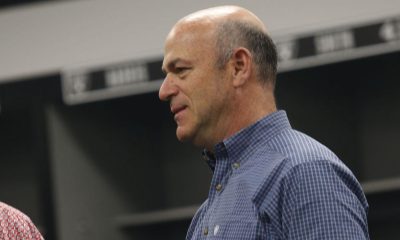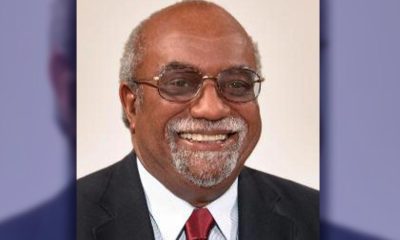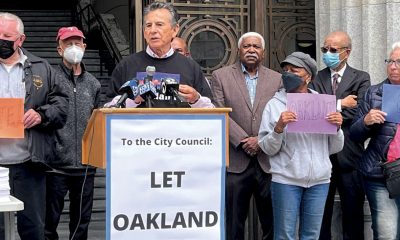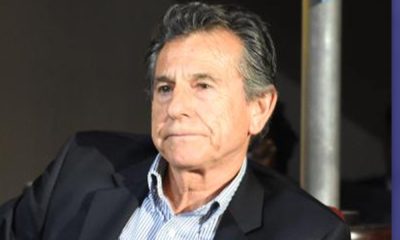Featured
Gray Leads A’s To Win Over Angels
Oakland, CA – It’s been awhile since these two teams have faced each other. Now it’s a battle for first place and while the A’s have held the position for half the season, the Angels now own it but in this much anticipated series will determine the better of the two teams.
“It hasn’t been our best stretch here recently,” said Oakland’s manager Bob Melvin pre-game. “We haven’t seen them in awhile, hopefully this picks up our intensity and moves us past this difficult period. Hoping the excitement of this series gets us back to doing what we’ve been doing early in the season.”
The A’s did just that taking game one of the three-game series with a 5-3 victory over the Angels. Oakland is now one game behind the Angels in the American League West. The offense was most impressive, four different guys drove in runs making it a team effort from all.
“We haven’t played like this in awhile,” Melvin said.
Mike Trout didn’t waste anytime taking Sonny Gray deep in the first after hitting a solo home run making it a 1-0 game. Gray settled in forcing a pop-up, a walk and a fly out to end the inning. Coco Crisp answered with a solo home run to leadoff the bottom of the frame. His ball was hit exactly where Trout did tying the game 1-1.
“Trout hits a home run, then Coco answers, that was big,” said Melvin. “That’s like, all right, we’re fine.”
Josh Hamilton extended the Angels lead with a solo shot to right field. Gray has never allowed a home run in MLB on a curveball before tonight. Both Trout and Hamilton hit home runs off his curveballs. Gray got some defensive help, with runners on second and third in the fifth. Kole Calhoun lined into a unassisted double play at second to end the frame.
The A’s tied the game again in the fifth on a fielder’s choice. Hector Santiago gave up a double to Crisp and forced Craig Gentry to ground out. Josh Donaldson hit to shortstop Eric Aybar who over threw first base allowing Crisp to score while Donaldson was safe at second.
Gray almost went the distance pitching in the ninth inning until he gave up a walk to Hamilton. Sean Doolittle took over but before he did Gray walked off the mound to a standing ovation. Gray tossed 8.1 innings, walked two, struck out five and kept his pitch count low. He snapped his four-game losing streak, his longest since pitching a compete game on April 28.
“I really didn’t change anything, I gave up two solo homers early in the game but other than that I felt like I made all of my pitches,”Gray said. “Everything felt good, fastball, curveball and my changeup. It was important not just for me but the team, we needed to go in here tonight, and get this win.”
Sam Fuld’s RBI triple in the sixth made it a 3-2 game. Fuld scored on Andy Parrino’s sacrifice fly extending their lead 4-2. When Stephen Vogt lined a solo home run to right field in eighth for the insurance run that put Oakland ahead 5-2. The A’s now lead the season series against Los Angeles and are 4-0 at home against the Angels.
“We don’t want to get too caught up, it’s one game,” said Fuld. “Given our struggles of late, it was great to get that first one under our belt.”
Once Doolittle took over, the Angels tried to rally back. David Freese hit a RBI single trimming the lead 5-3. Doolittle walked the next batter loading the bases with the tying run on base. Having to work for his 19th save, he struck out Chris Iannetta to end the game after giving up a pair of singles and a walk.
” They battled,” said Doolittle. ” I think that right there is an example of why they’ve been so successful lately, winning a lot of close games, coming from behind in a lot of games to get the win.”
“We haven’t gotten it done up here yet this year, but I think we’re a better team now than we’ve been at any time during the season,” Angels manager Mike Scioscia said. “They’re a good club over there and they certainly can shut you down when they get a lead. They do a lot of different things, and we have to be ready for it.”
Activism
Oakland Post: Week of April 17 – 23, 2024
The printed Weekly Edition of the Oakland Post: Week of April 17 – 23, 2024

To enlarge your view of this issue, use the slider, magnifying glass icon or full page icon in the lower right corner of the browser window. ![]()
Activism
Oakland Schools Honor Fred Korematsu Day of Civil Liberties
Every Jan. 30, OUSD commemorates the legacy of Fred Korematsu, an Oakland native, a Castlemont High School graduate, and a national symbol of resistance, resilience, and justice. His defiant stand against racial injustice and his unwavering commitment to civil rights continue to inspire the local community and the nation. Tuesday was “Fred Korematsu Day of Civil Liberties and the Constitution” in the state of California and a growing number of states across the country.

By Post Staff
Every Jan. 30, OUSD commemorates the legacy of Fred Korematsu, an Oakland native, a Castlemont High School graduate, and a national symbol of resistance, resilience, and justice.
His defiant stand against racial injustice and his unwavering commitment to civil rights continue to inspire the local community and the nation. Tuesday was “Fred Korematsu Day of Civil Liberties and the Constitution” in the state of California and a growing number of states across the country.
One OUSD school is named in his honor: Fred T. Korematsu Discovery Academy (KDA) elementary in East Oakland.
Several years ago, founding KDA Principal Charles Wilson, in a video interview with anti-hate organization “Not In Our Town,” said, “We chose the name Fred Korematsu because we really felt like the attributes that he showed in his work are things that the children need to learn … that common people can stand up and make differences in a large number of people’s lives.”
Fred Korematsu was born in Oakland on Jan. 30, 1919. His parents ran a floral nursery business, and his upbringing in Oakland shaped his worldview. His belief in the importance of standing up for your rights and the rights of others, regardless of race or background, was the foundation for his activism against racial prejudice and for the rights of Japanese Americans during World War II.
At the start of the war, Korematsu was turned away from enlisting in the National Guard and the Coast Guard because of his race. He trained as a welder, working at the docks in Oakland, but was fired after the bombing of Pearl Harbor in 1941. Fear and prejudice led to federal Executive Order 9066, which forced more than 120,000 Japanese Americans out of their homes and neighborhoods and into remote internment camps.
The 23-year-old Korematsu resisted the order. He underwent cosmetic surgery and assumed a false identity, choosing freedom over unjust imprisonment. His later arrest and conviction sparked a legal battle that would challenge the foundation of civil liberties in America.
Korematsu’s fight culminated in the Supreme Court’s initial ruling against him in 1944. He spent years in a Utah internment camp with his family, followed by time living in Salt Lake City where he was dogged by racism.
In 1976, President Gerald Ford overturned Executive Order 9066. Seven years later, the 9th Circuit Court of Appeals in San Francisco vacated Korematsu’s conviction. He said in court, “I would like to see the government admit that they were wrong and do something about it so this will never happen again to any American citizen of any race, creed, or color.”
Korematsu’s dedication and determination established him as a national icon of civil rights and social justice. He advocated for justice with Rosa Parks. In 1998, President Bill Clinton gave him the Presidential Medal of Freedom saying, “In the long history of our country’s constant search for justice, some names of ordinary citizens stand for millions of souls … To that distinguished list, today we add the name of Fred Korematsu.”
After Sept. 11, 2001, Korematsu spoke out against hatred and discrimination, saying what happened to Japanese Americans should not happen to people of Middle Eastern descent.
Korematsu’s roots in Oakland and his education in OUSD are a source of great pride for the city, according to the school district. His most famous quote, which is on the Korematsu elementary school mural, is as relevant now as ever, “If you have the feeling that something is wrong, don’t be afraid to speak up.”
Community
For Cervical Cancer Month, Medical Community Focused on Education
January was Cervical Cancer Awareness Month. Physicians, advocates and others in the medical community commemorated the month by raising awareness about a form of cancer they say is highly preventable and treatable. Cervical cancer is caused by a virus called the human papillomavirus (HPV) and it develops slowly over time but can be prevented with proper care in girls as young as 13 years old.

By Magaly Muñoz
January was Cervical Cancer Awareness Month.
Physicians, advocates and others in the medical community commemorated the month by raising awareness about a form of cancer they say is highly preventable and treatable.
Cervical cancer is caused by a virus called the human papillomavirus (HPV) and it develops slowly over time but can be prevented with proper care in girls as young as 13 years old.
Sonia Ordonez, an OBGYN and gynecology surgeon at Kaiser Permanente, stated that as soon as people with cervixes reach the maturity reproductive age, they should start taking preventative measures like getting the HPV vaccine. The vaccine involves a series of two-doses for people aged 9 through 14 or three-doses for people 15 through 45 years old.
“I see a lot of young women who can’t remember or may not have gotten [the vaccine] when they were younger, or maybe got one, but we can give them the series of vaccines and restart at any point in time,” Ordonez said.
She said that cervical cancer is not the only cancer caused by HPV. Strains of the virus can also lead to throat, anal and penile cancers.
Screening is also an effective way to check for cervical cancer and should be done every three years after someone turns 21, doctors recommend. It is best to start as early as possible to catch occurrences early.
Ordonez said that this cancer is also more likely found in people of color and has led to more deaths overall.
A Mayo Clinic article published last month stated that Black women are more likely to be diagnosed and die of cervical cancer, compared to White women in the U.S.
2,000 Black women are diagnosed every year with cervical cancer and 40% die as a result.
“This disparity is not due to genetic differences among White, Black or Hispanic women, but rather related to systemic racism, access to healthcare and socioeconomic factors,” Dr. Olivia Cardenas-Trowers, a Mayo Clinic urogynecologist, said in the article.
Ordonez stated that immigrant women are also highly susceptible to the cancer, as many Latin American countries may not have accessibility to screenings or lack of insurance makes it harder for them to get tested.
Hispanic women are 40% more likely to be diagnosed with cervical cancer, and 30% more likely to die from it, as compared to non-Hispanic White women, according to the Office of Minority Health.
Family medicine physician, Joy Anyanwu, stated that the pandemic contributed to hesitancy about getting cervical cancer screenings among some women. Other factors are people’s aversion to vaccines, parents not wanting to believe that their children are or will become sexually active, and doubt about the overall effectiveness of the vaccine.
“The vaccine is very safe — over 97% effective in preventing cervical cancer,” Anyanwu said. “Even if you aren’t having sex, the earlier you start would actually help.”
Anyanwu said she understands that parents might not want to ask questions about their children’s reproductive health, but it’s a mindset that can be a barrier to having important conversation about prevention or care.
To keep families their families and communties healthy, the doctor emphasized that people should prioritize keeping up with their vaccine series and going to screenings every year.
-

 Activism4 weeks ago
Activism4 weeks agoOakland Post: Week of March 20 – 26, 2024
-

 #NNPA BlackPress3 weeks ago
#NNPA BlackPress3 weeks agoCOMMENTARY: D.C. Crime Bill Fails to Address Root Causes of Violence and Incarceration
-

 #NNPA BlackPress3 weeks ago
#NNPA BlackPress3 weeks agoMayor, City Council President React to May 31 Closing of Birmingham-Southern College
-

 #NNPA BlackPress3 weeks ago
#NNPA BlackPress3 weeks agoCOMMENTARY: Lady Day and The Lights!
-

 #NNPA BlackPress3 weeks ago
#NNPA BlackPress3 weeks agoFrom Raids to Revelations: The Dark Turn in Sean ‘Diddy’ Combs’ Saga
-

 #NNPA BlackPress3 weeks ago
#NNPA BlackPress3 weeks agoBaltimore Key Bridge Catastrophe: A City’s Heartbreak and a Nation’s Alarm
-

 #NNPA BlackPress3 weeks ago
#NNPA BlackPress3 weeks agoBaltimore’s Key Bridge Struck by Ship, Collapses into Water
-

 Activism3 weeks ago
Activism3 weeks agoOakland Post: Week of March 27 – April 2, 2024




















































